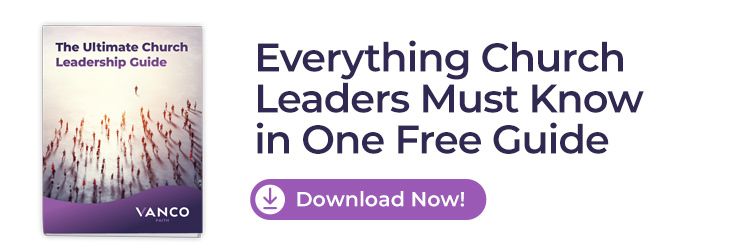When you think of the best people to fill church leadership roles and responsibilities, you don’t consider the faint-hearted. A church leader needs to be a Godly leader, a role model, and a guidance giver – not only for your church members but for everyone else in the community too. They mentor and encourage people, furthering their faith and ensuring that they have a positive church experience. Helping to make your church a warm and welcoming community is an important responsibility of church leaders. Church leadership roles and responsibilities can’t be fully understood without a clear understanding of the unique qualities of each role. Having good church leadership will also help retain members and keep the church from struggling. Keep reading to learn the 12 church leadership roles and responsibilities to enhance your ministry.
Key Church Leadership Roles and Responsibilities to Support Senior Pastors
Churches small and large cannot operate under the silo of a senior pastor. In churches that thrive, the senior pastor has a strong team, similar to the structure of a corporation.
The senior pastor acts as the CEO, and their leadership team oversees the various departments within the business. The Board of Deacons often serves as the Board of Directors.
Without structure, the pastor would bear all of running the church. The pastor would become overwhelmed and ineffective, but there is also the risk of their leadership becoming too powerful and unbalanced.
Churches, like any other organization, must have checks and balances. To grow your ministry, it’s essential to fill key leadership positions with qualified individuals who share the pastor’s vision and are true believers.
1. Associate Minister
A senior pastor can appoint one or many associate ministers. These roles are typically unpaid unless the individual is hired as part of the church’s administrative staff in another capacity.
Associate ministers are men and women who are aspiring to become senior pastors. They have received some level of training and could already have gone through ordination. Ordained ministers can carry the title of associate pastor.
Some individuals see their role as on-the-job training. They can provide support by filling in for the pastor as a speaker during his absence. Their duties can also include administering communion to the sick and shut-in and presiding over funerals for non-members.
2. Executive Minister of Administration
The executive minister of administration is a key position in most churches, likened to a corporate vice president role. The person serving in this capacity is second in command and will take the helm during the pastor’s absence.
It is wise to fill these church leadership roles and responsibilities with a pastor because they can serve in that capacity when the senior pastor is on sabbatical. As a matter of respect and protocol, it’s best to have someone of this caliber overseeing the associate ministers.
This executive position also oversees the church’s staff. Not only do you want someone with ministry experience, but they should also have business and leadership training.
Having an executive minister of administration has many benefits. The most important benefit is that it frees up the pastor’s time to attend community meetings and advocate for church funding and other resources.
3. Minister of Finance
 Church leadership roles and responsibilities include handling large sums of cash. Although churches carry tax-exempt status, they still require someone in a church leadership role to oversee their finances.
Church leadership roles and responsibilities include handling large sums of cash. Although churches carry tax-exempt status, they still require someone in a church leadership role to oversee their finances.
The Minister of Finance can be in a paid or unpaid position. It depends on the actual responsibilities of the person in the position.
In a small or medium-size church, the minister of finance will oversee the collection of offerings. They determine the procedures for counting the money, plus how and when it’s deposited at the back.
For a large church or megachurch, the minister of finance takes on the role of the comptroller. They oversee every aspect of the church’s finances. It’s a good idea to choose someone who is a Certified Public Accountant (CPA) or has extensive accounting experience.
If they are not a CPA, the individual will become the point of contact for the church’s external CPA. They will supply the necessary reports and act as a liaison between the CPA and the church’s pastor.
The finance teams within the church’s administration report to this key figure. These include:
- Accounting departments
- Bookstore staff
- Special events
The minister of finance also oversees the board of trustees and works with the church deacons and associate pastors.
4. Minister of Education

The minister of education oversees the education portion of a church’s various ministries. Education ministries include:
- New member’s courses
- Sunday School curriculum
- Vacation Bible School
- Ministry training courses
The minister of education will play a pivotal role in the curriculum for the youth ministry. They may also have input if the church has a daycare or private school.
The qualifications for biblical church leadership in this capacity should include formal training or experience in education. This person must also have the ability to oversee Christian education for toddlers to seniors.
5. Minister of Music and Performing Arts
One of the most revered church leadership roles and responsibilities is in the contemporary church is the minister of music. If a church has an outstanding choir and performing arts ministry, it becomes a magnet for younger generations and families with children.
The church leadership role and responsibilities of the minister of music are to recruit members to sing in various church choirs. These choirs can include:
- Mass choirs
- Senior choir
- Young adult choir
- Men’s choir
- Children’s choir
The minister of music conducts choir rehearsals, hires musicians, secures copyrights for recorded music performances and approves community performances. This ministry leader also works with the church’s school and daycare, if applicable.
Many churches today also have performing arts ministries. These ministries encompass the following:
- Theatrical performances
- Liturgical dancers
- Mime performers
- Church choir competitions
Ministers of music are typically salaried positions with benefits.
6. Executive Leader of Ministries
Contemporary churches go beyond biblical church leadership when addressing the needs of their communities. Churches have various ministries. The bigger the congregation, the more ministries a church can offer.
For this reason, a church can have numerous non-traditional ministries that operate in an unorthodox manner.
Executive leaders of church ministries oversee each ministry and ensure the ministry leader is operating within the church bylaws.
The bylaws have rules that regulate ministries, and these rules can include a term limit on how long someone can serve in a leadership capacity. The executive leader of ministries is charged with overseeing the transition of ministry leaders out of one role and into another.
Qualifications for church leadership over ministries require strong leadership and business acumen skills. The individual must be organized and works well under pressure.
Additional duties include working with ministry leaders to develop a schedule of events, prepare an annual budget and organize recruitment events. The executive leader of ministries also serves as a mediator to resolve disputes amongst ministry members.
7. Youth Pastor

Youth pastors are paid church employees. The youth pastor has similar church leadership roles and responsibilities as the church’s senior pastor. The youth department has a separate sanctuary and youth facilities on larger church campuses.
Depending on the size of the church, the youth & children’s ministry may have an administrative assistant and other church leadership roles similar to the main church.
Having the ability to relate well with youth is an essential characteristic of the youth pastor. They have the task of creating programs for youth, designing a youth-friendly atmosphere and choosing volunteers.
Youth pastors today are often of the millennial generation. They bring new ideas and concepts to attract youth to the church. This is done by engaging youth with technology and promoting Christian learning through creativity.
It is not lost on today’s church that the youth will become the future of the church. You will see youth ministries with budgets that mirror those of the media ministry and performing arts ministry.
8. Director of Youth Services
Underneath the youth pastor is a church role known as the director of youth services. These church leadership roles and responsibilities are in line with the executive leader of ministries. However, it does not have the same level of responsibility.
The director of youth services serves as a liaison for the youth pastor and will work closely with their administrative assistant. The role calls for the individual to oversee activities and groups within the youth ministry.
The youth choir and performing arts ministries fall under the direction of the minister of music. However, the director of youth services works with the youth to create the concepts and activities.
The youth pastor relies heavily on this church role to coordinate with community organizations interested in partnerships. They are instrumental in creating community engagement are service opportunities.
The people in church leadership serving youth must be energetic and love to work with youth. They bear the responsibility of bringing up the next generation of worshippers. You’ll see youth ministries participating in Christian retreats, youth outreach and mission work to build future leaders.
9. Minister of Outreach

The minister of outreach looks for opportunities for the church to serve the community. The goal is to reach the unchurched through unique discipleship ideas.
The person in this role must have strong communication skills, compassion, and the ability to organize events using your volunteers. Most outreach opportunities are service-based, which are extended to people who need services.
Some examples of outreach ministry include neighborhood clean-ups, home repair for the elderly and drives.
The minister of outreach also come up with ideas administered within the church on an ongoing basis. Examples include:
- After-school tutoring
- Baby supplies
- Career counseling
- Clothes closets
- Drug addiction support groups
- Financial planning
- Prisoner re-entry programs
- School supply drives
- Single parent support groups
In some instances, community-based organizations will ask to use the church as an extension of their services. This can come in the form of sponsoring Boy and Girl Scouts troops. The church may also partner with non-profits to offer food drives, HIV testing, or social services festivals.
10. Director of Evangelism Ministries
Evangelism ministries are the heartbeat of the church. The bible tells us to go out and minister to the lost and downtrodden. The director of the evangelism ministry understands the church’s role of going into the community and knocking on doors.
This individual must have compassion and the willingness to go the extra mile for others. They have exceptional knowledge of bible scriptures and community resources. They work in conjunction with the director of outreach.
The Evangelism ministry must have a good working rapport with various ministries because their church roles and responsibilities may cross.
The ministry relies heavily on volunteers. Their duties include going door-to-door to share the bibles and the ways to salvation. They also pass out tracts at local events like parades and festivals.
The director of the evangelism ministry also works with the prison system to bring in volunteers to minister to prisoners. Upon their release, the church can serve as a support system.
11. Director of Media and Communications

We’ve mentioned the media ministry a few times already. The media ministry has become an integral part of church ministry in the digital era. At the height of the COVID-19 pandemic, many churches would have closed their doors permanently if it were not for their media ministry.
Working knowledge of digital marketing is a desired qualification for church leadership roles and responsibilities. The director must also have photography and videography skills. Knowledge of copyright laws and rules for photographing and recording in commercial spaces is a useful skill for this position.
Media and communications ministries grow in numbers based on the size and budget of the church. The director ensures coverage at both on and off-campus services and events. It requires a team of skilled individuals who are available outside standard church services.
There has been growth in social media and live streaming. The director of media and communications oversees the church’s social media channels, as well as email and video marketing.
12. Director of Security
More than any other time in history, churches today are cognizant of the dangers that lurk within the church. Following violent incidents in churches across the country, security ministries have grown in popularity.
The director of security is often someone with a law enforcement background. This person can be a full-time staff member or volunteer.
Their church roles include providing security details for the senior pastor while on the church campus and traveling to special events. They also ensure church services are secure, particularly during the offering.
Often, church security teams consist of off-duty law enforcement and trained security guards. Most are licensed to carry concealed weapons.
Get Everything Church Leaders Must Know in One Free Guide
Get the tested church leadership strategies and techniques used by top ministries to build healthy and growing congregations. Download our free eBook to learn…
- What to avoid.
- How to set SMART goals.
- Leadership model structures to inspire your church leadership strategy.
- How to recruit volunteers and delegate.
- How to handle challenging situations such as disgruntled church members or staff.
- How to be a good financial steward for your church.
- And more!
Get the eBook

